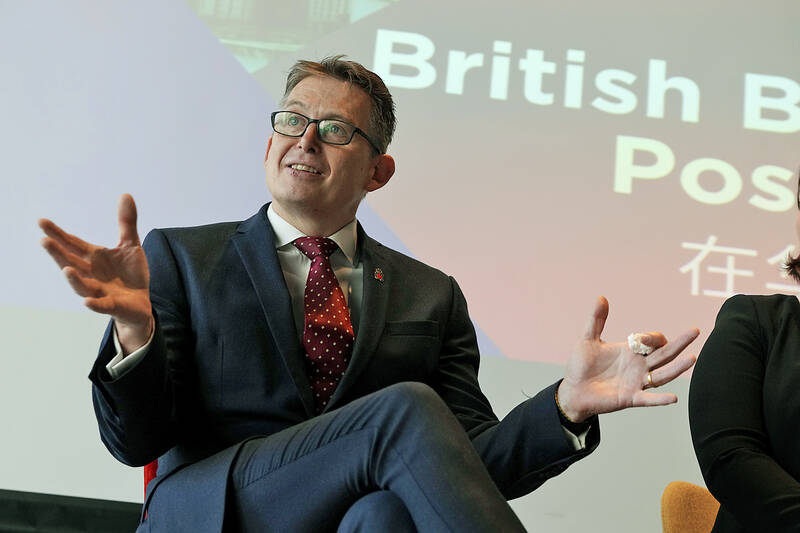Foreign companies in China are uncertain about what they are allowed to do following police raids on consulting firms, and want “greater clarity” about how newly expanded national security and other rules would be enforced, a foreign business group said yesterday.
The British Chamber of Commerce in China said a survey of its members found they are more optimistic following December’s lifting of anti-virus controls that blocked most travel into and out of China.
It said they want to invest, but are waiting for steps to “restore the trust and certainty” in China amid tension with Europe and Washington and official plans to promote economic self-reliance.

Photo: AP
“If there is greater clarity and greater certainty, then we believe that companies will commit more to China,” chamber chairman Julian MacCormac told a news conference.
About 70 percent of companies “are really waiting to see” how conditions develop before taking action, he said.
Chinese President Xi Jinping’s (習近平) government says foreign companies are welcome and is trying to encourage them to invest more.
However, they are uneasy following the expansion of national security and other rules with little explanation, and official plans to create competitors to global suppliers of processor chips and other technology, sometimes using subsidies and market barriers that have strained relations with the EU, Washington and other trading partners.
On Sunday, the government banned use of products from the biggest US maker of memory chips, Micron Technology Inc, in computers that handle sensitive information.
It said Micron had unspecified security flaws, but gave no explanation.
Companies are on edge after police raided offices of two consultancies, Bain & Co and Capvision, and a due diligence firm, Mintz Group. Authorities have given no explanation. They say companies are obliged to obey the law, but have given no indication of possible violations.
The British chamber represents about 650 companies, many of them in finance, consulting and other service industries that might be affected by tighter curbs on what information can be gathered in China and how it can be used and stored.
Yesterday’s report included 171 suggestions for Chinese regulators, including “greater clarity” about data restrictions on the auto industry and addressing what it said is unfair treatment of foreign companies in government purchasing.
Sally Xu, director of the chamber’s government relations, said member companies that responded to a request for questions ahead of a meeting next week with a Chinese Ministry of Commerce official all asked about the investigations of consultants.
“Our companies are concerned about this,” Xu said. “They wonder, where is the line between what we can do and cannot do?”
A survey last month found 76 percent of companies that responded are more optimistic following the end of anti-virus controls that blocked most travel into and out of China, the chamber said.
However, its report said the outlook is clouded by an unpredictable business environment, political tension and “increased talk of self-sufficiency.”
“This language around security and self-reliance needs to be balanced against the message of ‘welcome to come to China,’ because I think there is some nervousness,” McCormac said.
“It raises uncertainty about, what’s the future like for me as a company in China?” he said.

Vincent Wei led fellow Singaporean farmers around an empty Malaysian plot, laying out plans for a greenhouse and rows of leafy vegetables. What he pitched was not just space for crops, but a lifeline for growers struggling to make ends meet in a city-state with high prices and little vacant land. The future agriculture hub is part of a joint special economic zone launched last year by the two neighbors, expected to cost US$123 million and produce 10,000 tonnes of fresh produce annually. It is attracting Singaporean farmers with promises of cheaper land, labor and energy just over the border.

US actor Matthew McConaughey has filed recordings of his image and voice with US patent authorities to protect them from unauthorized usage by artificial intelligence (AI) platforms, a representative said earlier this week. Several video clips and audio recordings were registered by the commercial arm of the Just Keep Livin’ Foundation, a non-profit created by the Oscar-winning actor and his wife, Camila, according to the US Patent and Trademark Office database. Many artists are increasingly concerned about the uncontrolled use of their image via generative AI since the rollout of ChatGPT and other AI-powered tools. Several US states have adopted

A proposed billionaires’ tax in California has ignited a political uproar in Silicon Valley, with tech titans threatening to leave the state while California Governor Gavin Newsom of the Democratic Party maneuvers to defeat a levy that he fears would lead to an exodus of wealth. A technology mecca, California has more billionaires than any other US state — a few hundred, by some estimates. About half its personal income tax revenue, a financial backbone in the nearly US$350 billion budget, comes from the top 1 percent of earners. A large healthcare union is attempting to place a proposal before

KEEPING UP: The acquisition of a cleanroom in Taiwan would enable Micron to increase production in a market where demand continues to outpace supply, a Micron official said Micron Technology Inc has signed a letter of intent to buy a fabrication site in Taiwan from Powerchip Semiconductor Manufacturing Corp (力積電) for US$1.8 billion to expand its production of memory chips. Micron would take control of the P5 site in Miaoli County’s Tongluo Township (銅鑼) and plans to ramp up DRAM production in phases after the transaction closes in the second quarter, the company said in a statement on Saturday. The acquisition includes an existing 12 inch fab cleanroom of 27,871m2 and would further position Micron to address growing global demand for memory solutions, the company said. Micron expects the transaction to